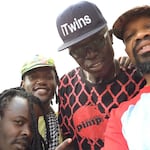Saturday afternoon there's a benefit scheduled for Portland MC Mic Crenshaw's Afrikan Hip-Hop Caravan. Rasheed Jamal will be onstage with recent work.
Crenshaw's been working on his third solo release, but he divides his time with commitments as KBOO's co-director, and the Caravan. Born out of Crenshaw's interest in human rights he's made two prior trips across the continent performing, writing, and talking with collectives and artists.
We talked to Crenshaw in December 2014, after his last month-long excursion to four countries in Africa.

Mic Crenshaw and friends / Courtesy of Mic Crenshaw
Here's what Mike told us about the music he heard and the people he met on the trip.
On the intense variety of languages reflected in South African rap:
"I think one of the most interesting things for me is understanding there are 17 official languages in South Africa. So you hear people rapping in Xhosa and Tswana and Zulu and mixing it with English, and it's a powerful thing. Seldom is an artist going to rap in one language, and often an artist will rap in two or three different languages. In Nairobi, (Kenya), there's a dialect called Sheng, which is a mixture of Swahili and English. There's this intense cultural exchange that's happening on many different levels."
On how people listen:
"I noticed the audience is more engaged than they are here. I feel like people are listening to the MC, making eye contact and really trying to pay attention to your lyrics. Here people seem to be a little more checked out. I don't feel like people have the attention span to really listen to the artist. Here it's more about hype. I saw a lot less people looking a their phones while the artists were performing (laughs) and I was consistently held accountable for my lyrics."
On tradition:
"We were consistently talking about the question of whether hip-hop is African or American or both, and if it is both, how is it both? This question of indigenous oral and rhythmic traditions — people are very aware of that. One person said to me specifically in Mwetu, South Africa, 'I feel like hip-hop dates back to some of our cultural traditions that pre-date American hip-hop'.
There's historically been a desire on the part of a lot of African Americans to migrate to Africa. People (in Africa) — it's almost like they're eagerly awaiting for us to take ownership of this cultural exchange. it'll be a shared ownership. One of the common sentiments expressed whenever I'm in Africa is 'Welcome home. How does it feel to be home?' For younger artists to be able to travel to African countries and see the realities of life there, I feel like it's my responsibility to create these opportunities, and also do the same thing for African artists, to come to the United States."
What artists in Africa are writing about:
"Still fresh in a lot of peoples' minds in South Africa specifically, was the Marikana Massacre, in which police killed, I think, 35 miners who were striking for a better wage. The levels of classism and how race plays into the justice system and the reality of police terrorism in a post-Apartheid South Africa in which large numbers of people who were suffering under poverty and marginalization are still suffering - (that's) something that is very present in people's lives. So people talk about that in their music."
(Editor's note: 44 people were killed in the course of several days during the Marikana miner's strike. 34 were killed on Aug. 16, 2012.)
Here's a rough guide of the places Mic visited, and some links to music from each region.
